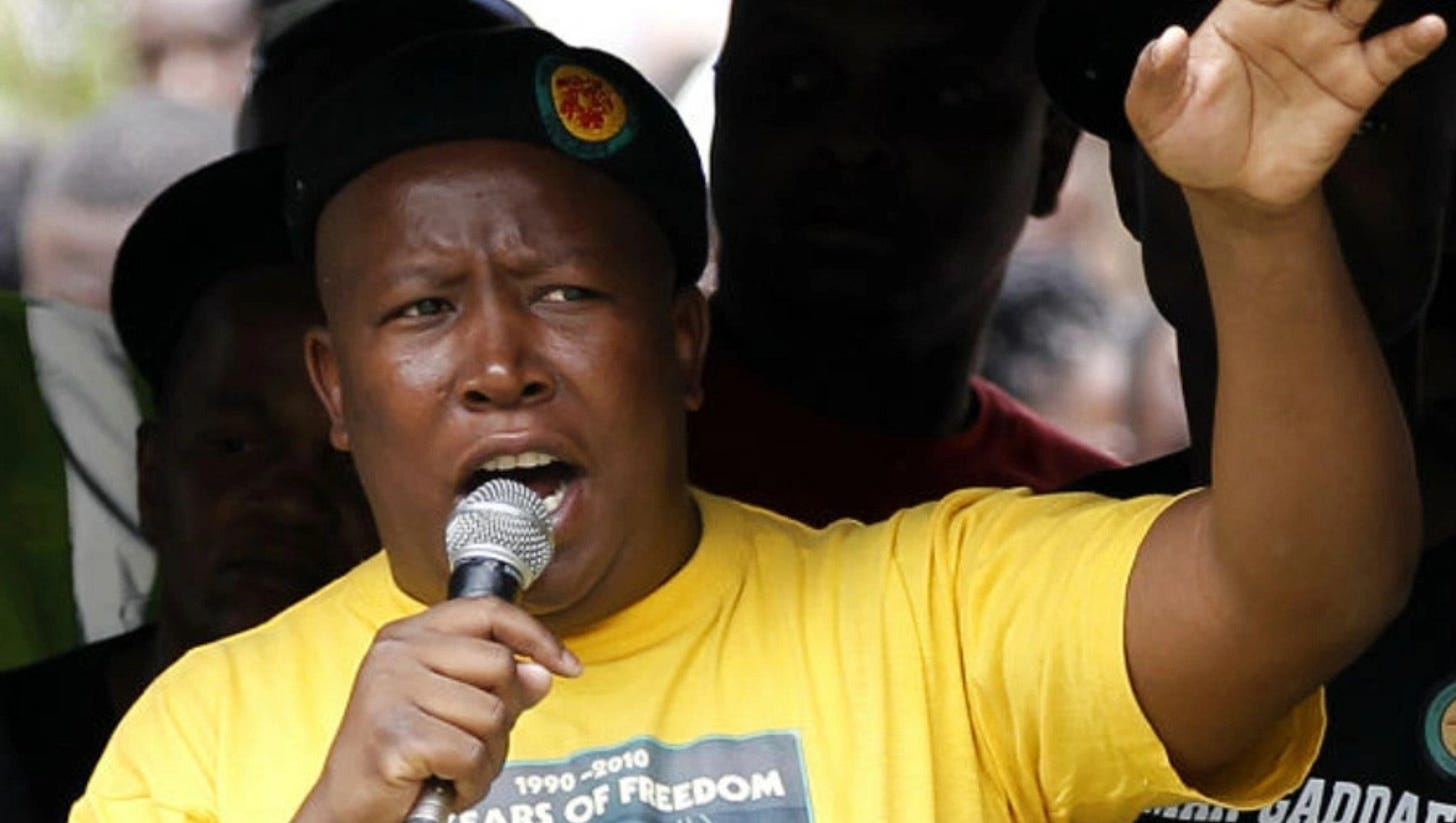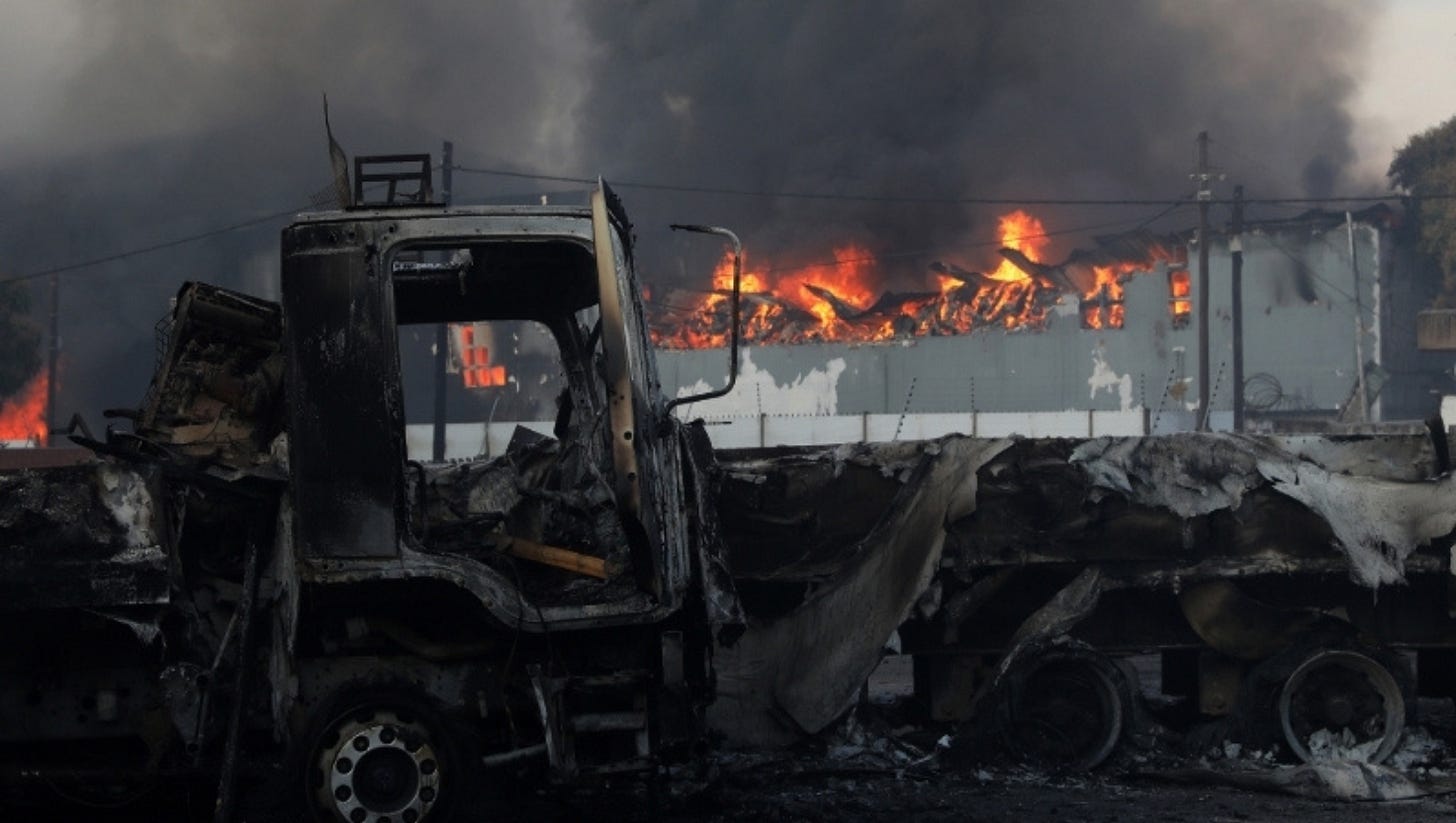How South Africa Dealt with Presidential Delinquency—America Should Pay Attention
South Africa showed that a president is not above the law. As Trump tightens his grip on the GOP, America faces its own test—while Malema’s narrative warns that extremism is a two-way street.
Last week, Dented Armour traced how a fringe group of White South Africans became part of Trump’s political theatre.
Not because of farm murders or land grabs, but because of lost privilege, dressed up as persecution. And now, they’ve been handed a megaphone by a man who knows how to inflate white grievance to justify a racial purist agenda.
But that’s one side of the coin.
Today, we flip it.
Because back in South Africa, another force is rising—just as polarizing, only from the opposite end of the spectrum.
His name is Julius Malema. And if Trump’s imported fantasy is about restoring supremacy, Malema’s domestic reality is about demolishing it.
This is the story of a radical-left movement: loud, militant, unapologetically populist.
A counterweight to MAGA, fanning the same embers, and complicating the South African government’s efforts to refute Elon Musk’s dystopian narrative.
The Malema Dilemma
Julius Malema and his radical left-wing party, the Economic Freedom Fighters (EFF), have weakened South Africa’s credibility in its push-back against the Trump–Musk narrative.
He didn’t accomplish this through action or his repeated calls to nationalize the mines or seize foreign-owned assets.
It wasn’t his push for more aggressive land expropriation, or even his frequent declarations that white South Africans should pack up and go.
No—what cut through most was his use of the Apartheid-era chant “Kill the Boer,” which, according to both the EFF and a 2022 ruling by South Africa’s Equality Court, does not amount to hate speech but rather a symbolic expression of resistance.
We acknowledge that if the shoe were on the other foot—if a group of Caucasians were chanting “Kill the Black man,” not only in South Africa, but in Europe, or (hopefully still) America—the reaction would be entirely different.
A Bit of Context
To understand this fully, it’s crucial to move beyond the simplistic and inaccurate framing that South Africa’s conflict is principally Black vs. White.

In reality, the story is far more complex.
Long before colonizers arrived, a rivalry existed between the Zulu and Xhosa nations, two indigenous peoples of the land.
Even less known are the Apartheid-era schemes deliberately designed to stoke violence between these groups.
The white minority regime understood that a united front—between the Zulu-founded Inkatha Freedom Party (IFP) and the predominantly Xhosa African National Congress (ANC)—would threaten their power.
Eventually, these two factions did unite to bring down Apartheid.
And with that, the ANC took power.
The Ruling ANC’s Conflicted Win
The Xhosa had effectively won twice—over the Zulu, and over white rule.
And so there was that inner party factionalism accompanied by the post-1994 pockets of Black-on-Black violence flaring up in a supposedly peaceful new dawn.
But when Zulu president Jacob Zuma came to power on May 9, 2009, things changed.
Many saw him as the Zulus’ own Mandela, though his presidency would prove far more divisive.
Zuma was also South Africa’s version of Trump: He had a passionate following, was controversial, often incoherent, and very much underqualified.
Court cases swirled around him, including allegations of sexual assault, fraud, and corruption, and like Trump, the presidential office was his saviour.
Once elected, he gutted the middle class and ran such a blatant patronage network that even the scandal-fraught ANC couldn’t stomach it.
He was forced out of office on February 14, 2018.
What happened Next is a lesson for Americans.
Many Republicans in both houses fear the consequences of moving against Trump.
Many Democrats and citizens share that concern, fearing that a pushing back on MAGA too hard could spark civil unrest.
And let’s not forget: nearly one-third of Americans didn’t vote—as if silence might somehow preserve the peace.
What deepens this unspoken unease is the fact that January 6 participants were pardoned, and groups like the Proud Boys and Oath Keepers—who’ve already shown that they’re willing to turn against the U.S. government for Trump—remain free and feel vindicated for their actions on that fateful day.
But I digress.
The Arrest of a Former President
Back in South Africa, Zuma’s loyalists tried to rally the military and high-ranking officials to block his removal from office. They failed.
Left with no choice, Zuma resigned, still demanding that the ANC’s National Executive Committee tell him exactly what he had done wrong.

In January 2018, the Zondo Commission was established to investigate state capture and corruption under Zuma’s leadership.
It held many accountable, including then-Deputy President Cyril Ramaphosa.
By 2021, Zuma himself was subpoenaed.
He refused to testify, claiming innocence and playing the victim. Sound familiar?
Eventually, the National Prosecuting Authority lost patience.
Then, on the night of July 7, convoys of police vehicles quietly surrounded Zuma’s upscale compound while throngs of armed supporters watched and high-ranking officials approached the gate to negotiate his surrender.

After an hours-long stand-off, Zuma turned himself in, opting to drive in his convoy to Escourt Correctional Center four hours away to serve a 15-month sentence for contempt of court.
The country was stunned.
But the message was clear: No one is above the law.
Anarchy
Not everyone agreed.

On July 8, the Pietermaritzburg High Court upheld its decision against Jacob Zuma, despite a barrage of appeals and public protests.
The next day, chaos erupted. Riots swept through Johannesburg and Durban.
Fuel tankers were torched. Warehouses looted. Roads blocked with burning tires. Businesses shuttered in panic.
By July 9, police had arrested 28 people. By July 24, that number had surged to 2,763.
The police were overwhelmed. The army had already been deployed for nearly two weeks, but the unrest continued to spiral.
Police Commissioner Bheki Cele claimed that 12 ringleaders were orchestrating the violence. Minister of Intelligence Ayanda Dlodlo suggested that senior ANC members were involved.
Citizens Take up Arms
With the state unable to contain the chaos, the burden of security shifted. Private security firms, taxi associations, armed civilians, and neighborhood vigilante groups stepped in.
They guarded petrol stations, shopping malls, supermarkets, and communications infrastructure.
In some areas, civilians—often backed by business owners—organized roadblocks, patrolled suburbs, and detained looters, sometimes violently, before handing them over to authorities.
By the time the dust settled, the toll was staggering:
Nearly $10 million in damages
150,000 jobs lost
5,500 arrests by August 12, 2022
And most harrowing of all, 354 lives lost
As state forces faltered, ordinary South Africans—Black, white, Indian, and Coloured—stood shoulder to shoulder, armed and united, guarding their neighborhoods.

Ironically, the looters feared these everyday citizens more than the official security forces.
The Chaos Turns Racial
Notably: There was an instance when the exchange became racial.
In an area named Phoenix in KwaZulu-Natal, which is dominantly populated by South African Indians, community members manning a roadblock stopped a truck carrying looted goods.
The vehicle's four occupants, all black, opened fire. The indians retaliated, killing one.
From then on, vehicles trying to enter the area were stopped, and their occupants were profiled along racial lines.
Thirty-six people were killed, and as many were arrested as a result.
The world was watching, and India’s minister of external affairs, Subrahmanyam Jaishankar, reached out to his South African counterpart, Naledi Pandor, expressing concern.
South Africa is doing its “utmost to enforce law and order,” Pandor assured the country with the world’s fourth-largest military.
Sanity Returned
Eventually, calm was restored, and Ramaphosa restructured his administration so that state security and intelligence fell under his direct oversight in what has been described as a super-presidency.
Julius Malema’s Qualms About an Abandoned Left-Wing Policy
During Zuma’s trial-riddled rise to power in 2009, “Awuleth’ Umshini Wami” (bring me my machine gun) re-emerged—not just as an anthem of struggle but as a political signal.
This was a song originally sung by Umkhonto we Sizwe, the ANC’s armed wing, back when it was still classified as a terrorist organization for resisting Apartheid.
Malema was the leader of the ANC Youth League and threw his full weight behind Zuma.
His vigorous campaigning helped oust Nelson Mandela’s successor, Thabo Mbeki, and replace him with the majority's new demagogue-like figure.
Rebellion
But Malema would eventually turn on Zuma.
Before long, ANC Youth League members were burning T-shirts with Zuma’s face on them in the streets, which led to Malema’s expulsion in 2012.
When asked why he turned on Zuma, he claimed the president had failed to deliver on the left-wing policy promises that got him elected in 2007.
But Zuma, despite his poor English and populist charm, was smart enough to know that fiery slogans and revolutionary chants wouldn’t fix a country—or he simply didn’t care and pursued nepotism and personal enrichment instead.
But it begs the question:
What left-wing policy was Julius Malema referring to?






